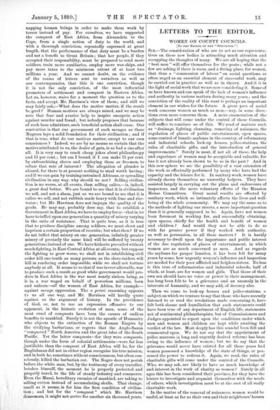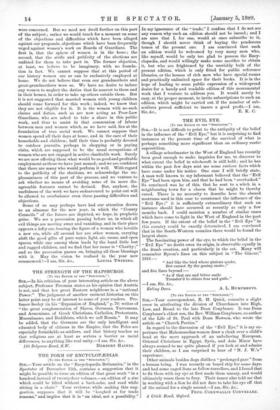LETTERS TO THE EDITOR.
WOMEN ON COUNTY COUNCILS.
[To THE EDITOR OF THE " Sim-resort:1 SIB,—The consideration of who are to act as our representa- tives on these new bodies is attracting much attention and occupying the thoughts of many. We are all hoping that the "best men" will offer themselves for the posts ; while not a few are asking if there is room, and a fitting place, for women, that thus a "communion of labour" on social questions, so often urged as an essential element of successful work, may be carried out in practice as well as in theory. And it is in the light of social work that we are now considering it. Some of us have known and can speak of the lack of woman's influence and authority in various matters during many years ; and the conviction of the reality of this want is perhaps an important element in our wishes for the future. A great part of social work concerns women as much as men,—nay, in some direc- tions even more concerns them. A mere enumeration of the subjects that will come under the control of these Councils, will suffice to convince us of this. We read of matters such as "drainage, lighting, cleansing, removing of nuisances, the regulation of places of public entertainment, open spaces, some control of lunatic asylums in the country, of reformatory and industrial schools, lock-up houses, police-stations, the rules of charitable gifts, and the introduction of general improvements." Surely in most, if not all of these, the help and experience of women may be acceptable and valuable, for has it not already been shown to be so in the past And in this new sphere we see the possibility of a vast extension of the work so effectually performed by many who have had the capacity and the leisure for it. In sanitary work, women have already shown themselves no unworthy helpers. They have assisted largely in carrying out the plans and endeavours of inspectors, and the more voluntary efforts of the Mansion House Committees. Great moral results are effected by sanitary work, which so intimately affects the lives and well- being of the whole community. We may say the same as to the methods of lighting our streets, a more important question than it is generally supposed to be. Again, have not women been foremost in working for, and successfully obtaining, open spaces, chiefly for the health and benefit of women and children ? And would they not be able to do so with far greater power if they worked with authority, as well as persuasion, in all these matters ? It is hardly necessary to dwell upon the importance and public interest of the due regulation of places of entertainment, in which women are as much concerned as men. And as regards the asylums for pauper lunatics, it has been felt for many years by some, how urgently women's influence and inspection are needed for their poor afflicted and helpless sisters. No less is this true of reformatories and industrial schools, half of which, at least, are for women and girls. That those of their own sex should have no voice or power in their management, has long been felt to be a grievance and an anomaly in the interests of humanity, and we may add, of decency also.
Then we come to lock-up houses and police-stations, a subject on which we venture to say that those who have recently listened to or read the revelations made concerning it, have felt both shame and humiliation that such statements could have been true of any department of English life, statements not of sentimental philanthropists, but of Commissioners and Judges appointed to report upon the conditions under which men and women and children are kept while awaiting the verdict of the law. Most deeply has this scandal been felt and commented upon. We do not say that the appointment of police matrons (a long and urgently desired reform) has been owing to the influence of women ; but we do say that the grievance would never have existed for all these years had women possessed a knowledge of the state of things, or pos- sessed the power to redress it. Again, we read, the rules of charitable gifts will come under the control of the Councils. Who, we may ask, are likely to have as much knowledge of and interest in the work of charity as women ? Surely in all ages this has been considered their province, for they have the leisure to investigate and acquaint themselves with the needs of others, which investigation must be at the root of all really charitable work.
In the matter of the removal of nuisances, women would be useful, at least as far as their own and their neighbours' houses
were concerned. But we need not dwell further on this part of the subject ; rather we would touch for a moment on some of the objections and difficulties which have been alleged against our proposals, objections which have been frequently urged against women's work on Boards of Guardians. The first is, that the sphere of women is in the home ; the second, that the strife and publicity of the elections are unfitted for them to take part in. The former objection, at least, we believe to be imaginary, with no founda- tion in fact. We cannot suppose that at this period of our history women are or can be exclusively employed at home. We do not believe that even our grandmothers and great-grandmothers were so. We have no desire to induce any women to neglect the duties that lie nearest to them and in their homes, in order to take up others outside them. But it is not suggested that married women with young children should come forward for this work ; indeed, we know that they are not eligible for it. It is the women with no such claims and duties, such as are now acting as Poor-Law Guardians, who are asked to take a share in this public work, and thus to assist in that communion of labour between men and women which, as we have said, lies at the foundation of true social work. We cannot suppose that women spend all their days at home, and in the care of their households and children ; half their time is probably devoted to outdoor pursuits, perhaps in shopping or in paying visits, which are supposed to be the usual occupations of women who are not engaged in active charitable work. Surely we are now offering them what would be as good and profitable employment as those we have just named ; and we are confident that there are many who would perform it well. With regard to the publicity of the elections, we acknowledge the un- pleasantness of this part of the process, and we venture to ask whether no means of avoiding some of its more dis- agreeable features cannot be devised. But, anyhow, the usefulness of the work we have endeavoured to point out will be allowed to overbalance even these passing difficulties and objections.
Some of us may perhaps have had our attention drawn to an almanac for the new year, in which the "County Councils" of the future are depicted, we hope, in prophetic guise. We see a procession passing before us, in which all evil things are moving away and vanishing, and in their place appears a lofty car, bearing the figure of a woman who heralds a new era, while all around her are other women, carrying aloft the good gifts of pure water, light, air, ozone, and open spaces, while one among them leads by the hand little lost and ragged children, and we find that her name is "Charity ;" and so the procession passes on, bringing all these blessings with it. May the vision be realised in the year now















































 Previous page
Previous page